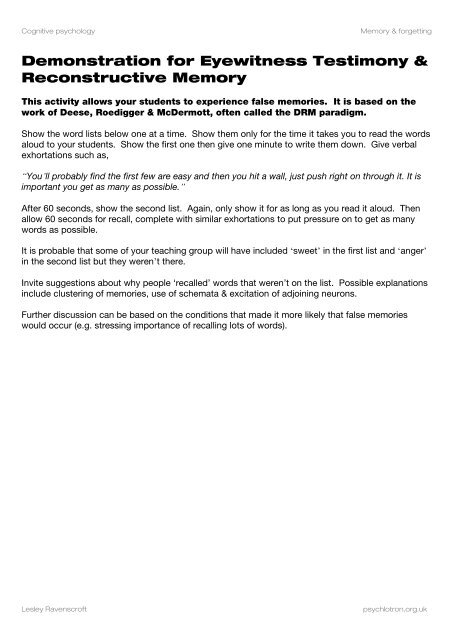Demonstration for Eyewitness Testimony & Reconstructive Memory
Demonstration for Eyewitness Testimony & Reconstructive Memory
Demonstration for Eyewitness Testimony & Reconstructive Memory
You also want an ePaper? Increase the reach of your titles
YUMPU automatically turns print PDFs into web optimized ePapers that Google loves.
Cognitive psychology<br />
<strong>Memory</strong> & <strong>for</strong>getting<br />
<strong>Demonstration</strong> <strong>for</strong> <strong>Eyewitness</strong> <strong>Testimony</strong> &<br />
<strong>Reconstructive</strong> <strong>Memory</strong><br />
This activity allows your students to experience false memories. It is based on the<br />
work of Deese, Roedigger & McDermott, often called the DRM paradigm.<br />
Show the word lists below one at a time. Show them only <strong>for</strong> the time it takes you to read the words<br />
aloud to your students. Show the first one then give one minute to write them down. Give verbal<br />
exhortations such as,<br />
“You’ll probably find the first few are easy and then you hit a wall, just push right on through it. It is<br />
important you get as many as possible.”<br />
After 60 seconds, show the second list. Again, only show it <strong>for</strong> as long as you read it aloud. Then<br />
allow 60 seconds <strong>for</strong> recall, complete with similar exhortations to put pressure on to get as many<br />
words as possible.<br />
It is probable that some of your teaching group will have included ‘sweet’ in the first list and ‘anger’<br />
in the second list but they weren’t there.<br />
Invite suggestions about why people ‘recalled’ words that weren’t on the list. Possible explanations<br />
include clustering of memories, use of schemata & excitation of adjoining neurons.<br />
Further discussion can be based on the conditions that made it more likely that false memories<br />
would occur (e.g. stressing importance of recalling lots of words).<br />
Lesley Ravenscroft<br />
psychlotron,org.uk
Cognitive psychology<br />
<strong>Memory</strong> & <strong>for</strong>getting<br />
Sour Sugar Toffee<br />
Nice Pop Taste<br />
Candy Bitter Cake<br />
Honey Chocolate Tooth<br />
Pie Good Tart<br />
Lesley Ravenscroft<br />
psychlotron,org.uk
Cognitive psychology<br />
<strong>Memory</strong> & <strong>for</strong>getting<br />
Mad Fight Fury<br />
Wrath Rage Calm<br />
Fear Hatred Emotion<br />
Happy Temper Enrage<br />
Hate Mean Annoy<br />
Lesley Ravenscroft<br />
psychlotron,org.uk
















